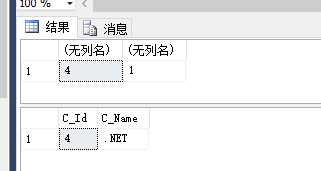标签:编译 问题 te pro alt procedure 表变量 red def 行存储
简介:
存储过程(stored procedure)是一组为了完成特定功能的SQL语句集合,经编译后存储在服务器端的数据库中,利用存储过程可以加速SQL语句的执行。
自定义存储过程,由用户创建并能完成某一特定功能的存储过程,存储过程既可以有参数又有返回值,但是它与函数不同,存储过程的返回值只是指明执行是否成功,
存储过程并不能像函数那样被直接调用,只能利用 execute 来执行存储过程。
优点:
1、提高应用程序的通用性和可移植性:存储过程创建后,可以在程序中被多次调用,而不必重新编写该存储过程的SQL语句。并且数据库专业人员可以随时对存储过程进行
修改,且对程序源代码没有影响,这样就极大的提高了程序的可移植性。
2、可以提高SQL的速度,存储过程是编译过的,如果某一个操作包含大量的SQL代码或分别被执行多次,那么使用存储过程比直接使用单条SQL语句执行速度快的多。
3、减轻服务器的负担:当用户的操作是针对数据库对象的操作时,如果使用单条调用的方式,那么网络上还必须传输大量的SQL语句,如果使用存储过程,
则直接发送过程的调用命令即可,降低了网络的负担。
语法:
1 CREATE PROC [ EDURE ] procedure_name [ ; number ]
2 [ { @parameter data_type }
3 [ VARYING ] [ = default ] [ OUTPUT ]
4 ] [ ,...n ]
5 [ WITH
6 { RECOMPILE | ENCRYPTION | RECOMPILE , ENCRYPTION } ]
7 [ FOR REPLICATION ]
8 AS
9 [ begin ]
10 T-SQL 语句
11 [ end ]
无参数存储过程:
1 --创建名为 GetStuCou 的无参数存储过程 2 create procedure GetStuCou 3 as 4 begin 5 select * 6 from Student s 7 left join Course c on s.C_S_Id=c.C_Id 8 end 9 10 --执行名为 GetStuCou 的无参数存储过程 11 execute GetStuCou
有返回值的存储过程:
1 --创建名为 GetStuCou_Re 的有返回值的存储过程 2 create procedure GetStuCou_Re 3 as 4 begin 5 insert into Course(C_Name) values(‘HTML5‘) 6 return SCOPE_IDENTITY(); -- 返回为当前表插入数据最后生成的标识值。 7 end 8 9 --执行名为 GetStuCou 的有返回值的存储过程 10 execute GetStuCou_Re
有输入参数的存储过程:
1 --创建名为 GetStuCou_In 的有输入参数的存储过程 2 create procedure GetStuCou_In 3 @StuNo nvarchar(64)=‘001‘ --设置默认值 4 as 5 begin 6 select * from Student where S_StuNo=@StuNo 7 end 8 9 --执行名为 GetStuCou_In 的有输入参数的存储过程(不传参数,即使用默认值) 10 execute GetStuCou_In 11 12 --执行名为 GetStuCou_In 的有输入参数的存储过程(传入参数) 13 execute GetStuCou_In ‘005‘
有输入、输出参数的存储过程:
1 --创建名为 GetStuCou_Out 的有输入参数和输出参数的存储过程 2 create procedure GetStuCou_Out 3 @StuNo nvarchar(64), 4 @Height nvarchar(32) output 5 as 6 begin 7 if(@StuNo is not null and @StuNo <> ‘‘) 8 begin 9 select @Height=S_Height 10 from Student 11 where S_StuNo=@StuNo 12 end 13 else 14 begin 15 set @Height=‘185‘ 16 end 17 end 18 19 --执行名为 GetStuCou_Out 的有输入参数和输出参数的存储过程 20 execute GetStuCou_Out ‘005‘,null
有输入、输出参数和结果集的存储过程:
1 --创建名为 GetStuCou_DS 的有输入参数、输出参数和结果集的存储过程 2 create procedure GetStuCou_DS 3 @StuNo nvarchar(64), 4 @Height nvarchar(32) output 5 as 6 begin 7 if(@StuNo is not null and @StuNo <> ‘‘) 8 begin 9 select @Height=S_Height 10 from Student 11 where S_StuNo=@StuNo 12 end 13 else 14 begin 15 set @Height=‘185‘ 16 end 17 18 select s.S_Id,s.S_StuNo,s.S_Name,s.S_Sex,s.S_Height,s.S_BirthDate,c.C_Id,c.C_Name 19 from Student s 20 left join Course c on s.C_S_Id=c.C_Id 21 where S_StuNo=@StuNo 22 end 23 24 --执行名为 GetStuCou_DS 的有输入参数、输出参数和结果集的存储过程 25 execute GetStuCou_DS ‘005‘,null
返回多个结果集的存储过程:
1 --创建名为 GetStuCou_DSS 的返回多个结果集的存储过程 2 create procedure GetStuCou_DSS 3 @StuNo nvarchar(64), 4 @Height nvarchar(32) 5 as 6 begin 7 if(@StuNo is not null and @StuNo <> ‘‘) 8 begin 9 select * 10 from Student 11 where S_StuNo=@StuNo 12 end 13 14 if(@Height is not null and @Height <> ‘‘) 15 begin 16 select * 17 from Student 18 where S_Height=@Height 19 end 20 end 21 22 --执行名为 GetStuCou_DSS 的返回多个结果集的存储过程 23 execute GetStuCou_DSS ‘005‘,‘185‘
存储过程里面不仅可以进行查询,还可以进行各种增删改操作。其实存储就是由很多 T-SQL 语句组成的代码块。
存储过程中创建变量、赋值变量、创建表变量和临时表:
1 --创建名为 GetStuCou_Ext 的返回多个结果集的存储过程 2 create procedure GetStuCou_Ext 3 @StuNo nvarchar(64), 4 @Height nvarchar(32) 5 as 6 begin 7 declare @Var nvarchar(10) --定义变量 8 9 set @Var=‘123‘ --赋值变量 10 11 --定义表变量 12 declare @StuTab table 13 ( 14 ID int not null primary key, 15 StuNo nvarchar(50) unique, 16 Name varchar(50), 17 Sex varchar(10), 18 Height varchar(10) 19 ) 20 --表变量只能在定义的时候添加约束 21 22 --定义临时表 23 create table #Tab 24 ( 25 ID int not null primary key, 26 StuNo nvarchar(50), 27 Name varchar(50), 28 Sex varchar(10), 29 Height varchar(10) 30 ) 31 32 alter table #Tab add constraint S_UNIQUE unique(StuNo) 33 34 --临时表可以在之后添加约束 35 36 if(@StuNo is not null and @StuNo <> ‘‘) 37 begin 38 insert into @StuTab(ID,StuNo,Name,Sex,Height) --把数据插入表变量 39 select S_Id,S_StuNo,S_Name,S_Sex,S_Height 40 from Student 41 where S_StuNo=@StuNo 42 43 insert into #Tab(ID,StuNo,Name,Sex,Height) --把数据插入临时表 44 select S_Id,S_StuNo,S_Name,S_Sex,S_Height 45 from Student 46 where S_StuNo=@StuNo 47 end 48 49 if(@Height is not null and @Height <> ‘‘) 50 begin 51 insert into @StuTab(ID,StuNo,Name,Sex,Height) --把数据插入表变量 52 select S_Id,S_StuNo,S_Name,S_Sex,S_Height 53 from Student 54 where S_Height=@Height 55 56 insert into #Tab(ID,StuNo,Name,Sex,Height) --把数据插入临时表 57 select S_Id,S_StuNo,S_Name,S_Sex,S_Height 58 from Student 59 where S_Height=@Height 60 end 61 62 SELECT * FROM @StuTab 63 select * from #Tab 64 end 65 66 --执行名为 GetStuCou_DSS 的返回多个结果集的存储过程 67 execute GetStuCou_Ext ‘005‘,‘185‘
存储过程动态执行 SQL 语句:
以上可以看出我们传入的参数(学号)是单个的,那么如果一次性传入多个学号呢(使用逗号隔开,即 ‘005,006,007‘ ),这就需要用到动态拼接并执行 sql 语句。
1 create proc GetStus 2 @StuNo nvarchar(500) 3 as 4 begin 5 declare @Sql nvarchar(3000) 6 7 if(@StuNo is not null and @StuNo <> ‘‘) 8 begin 9 set @Sql=‘ select * from Student where S_StuNo in (‘+@StuNo+‘) ‘ 10 end 11 12 exec (@Sql) --执行动态 sql 13 end 14 15 exec GetStus ‘003,005,009‘ --执行存储过程 GetStus
现在还有一个问题,我想要执行动态 sql 的时候并返回变量值,比如我现在需要执行动态 sql 的时候返回课程 ID ,然后根据课程 ID 查询课程。
使用系统存储过程 sp_executesql 动态 sql 给变量赋值。
修改存储过程之后:
1 ALTER proc [dbo].[GetStus] 2 @StuNo nvarchar(500) 3 as 4 begin 5 declare @Sql nvarchar(3000) 6 declare @C_Id int 7 declare @Cou int 8 9 if(@StuNo is not null and @StuNo <> ‘‘) 10 begin 11 set @Sql=‘ select @CId=C_S_Id,@cou=count(1) from Student where S_StuNo in (‘+@StuNo+‘) group by C_S_Id ‘ 12 end 13 14 exec sp_executesql @Sql,N‘@CId int output,@cou int output‘,@CId = @C_Id output,@cou = @Cou output; 15 16 select @C_Id,@Cou --查看返回变量的值 17 18 select * from Course where C_Id=@C_Id 19 end 20 21 exec GetStus ‘005‘ --执行存储过程 GetStus

PS:sp_executesql 要求动态 Sql 和动态 Sql 参数列表必须是 NVARCHAR 类型。
动态Sql的参数列表与外部提供值的参数列表顺序必需一致,例如:N‘@CId int output,@cou int output‘,@CId = @C_Id output,@cou = @Cou output;,@CId 对应 @C_Id,@cou 对应 @Cou。
动态SQl的参数列表与外部提供参数的参数列表参数名可以同名,如果不一样,需显示注明,例如:N‘@CId int output,@cou int output‘,@CId = @C_Id output,@cou = @Cou output;,即 @CId = @C_Id 和 @cou = @Cou 。
标签:编译 问题 te pro alt procedure 表变量 red def 行存储
原文地址:https://www.cnblogs.com/asdyzh/p/9818619.html